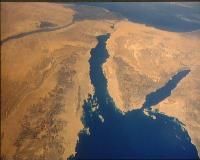Keep Watching the Middle East!
Written by Mike Bennett
 Events in the Middle East keep rushing toward an uncertain future—a future that will affect the whole world. What does the Bible say is ahead for the Middle East?
Events in the Middle East keep rushing toward an uncertain future—a future that will affect the whole world. What does the Bible say is ahead for the Middle East?
Keeping up with new developments in the Middle East can be challenging for Westerners with little historical or geographical knowledge of the area. But the rapidly changing Middle East is vital to Western interests, and not just because it controls much of the world’s known oil reserves. Because of that oil, as well as a clash of cultures, the Middle East is also a flash point for potential conflicts that could engulf the world.
Consider some of the events of this week.
Egypt on the brink
Amidst a violent crackdown on a new wave of protests in Tahrir Square, the Egyptian cabinet resigned. But it’s not the cabinet the protesters are after, but the military leaders themselves. The military has been ruling Egypt since Hosni Mubarak was driven from power by the last wave of protests in February, but the military leaders have not fulfilled their promises to the people.
The Muslim Brotherhood, which was an essential part of the last protest, has not yet joined this protest. “The Muslim Brotherhood was the only major political group that announced it would hold back from Tuesday’s demonstrations. It said in a statement that it did not want to be involved in a protest that might delay the elections and thus the transition to democracy,” reported The New York Times.
The New York Times ended its piece with a quote from an 18-year-old Egyptian protester who captured the uncertainty of the future there, and throughout the Middle East: “‘People don’t want military rule, and they won’t leave here until the field marshal goes too. … But I don’t really know what happens if he does. Who will take hold of the country?’”
For more background on the situation in Egypt, see “What’s Next for Egypt and Israel?”
Uncertainty in Syria
Pressure on the Syrian President Bashar al-Assad to quit is growing day by day. Not only has the Arab League suspended Syria’s membership, but King Abdullah of Jordan demanded new leadership for Syria Nov. 14.
After a busload of Turkish citizens was fired on in Syria Nov. 21, Turkish Prime Minister Recep Tayyip Erdogan called on his former friend to step down. “If he can’t learn his lesson, he should look at the Libyan leader who was killed after turning his guns on his own people,” Bloomberg quoted the Turkish leader as saying.
Who would replace Assad? The Syrian opposition is not even as unified as the Libyan opposition, creating fears of continued instability in both countries.
The Iranian nuclear genie
Western nations increased their sanctions against Iran, though few believe this pressure will halt Iran’s nuclear weapons program. Fears of an Israeli attack on Iran’s nuclear facilities and the terror that might unleash seem only exceeded by fears of what a nuclear-armed Iran might do. (See our blog post, “An Iran With Nuclear Weapons Strikes Fear Across the Middle East.”
Jordan and the Palestinians
In the West Bank, Jordan’s King Abdullah made an unusual visit to Ramallah to talk with Palestinian Authority President Mahmoud Abbas. The stated aim of the visit is to further the efforts to establish a Palestinian state “along the 1967 lines.”
The visit also strengthens Abbas’ position as he prepares to meet rival Hamas leader Khaled Mashaal “in yet another attempt to implement the Egyptian-sponsored reconciliation accord that was announced last May. The summit will focus on the formation of a caretaker government that would prepare for presidential and parliamentary elections,” reported the Jerusalem Post.
In the tinder-dry relations between the Palestinians and Israelis, such potential sparks always bear watching. For more background, see “Palestinian Statehood: Will It Bring Peace?”
A firm foundation amid shifting sands
The old status quo of the Middle East, held firm by long-ruling regimes in key Arab countries, has shifted; and where things will end is still unclear. However, the unrest could be setting the stage for the coalescing of power in the hands of a leader the Bible calls “the king of the South” (Daniel 11:40-43). (See more about this in our post, “End-Time Prophecy Jigsaw: The Pieces Are Falling Into Place!”)
For sure, the changes signal new dangers for the nation of Israel and for the city of Jerusalem in particular. The Bible identifies these as key areas to watch in the unfolding of end-time events (Zechariah 12:2-3).
The Bible also reveals that beyond all the terrifying events that will engulf the Middle East and the world, Jerusalem will soon become a focal point of peace. It will be established as the capital of the Kingdom of God on the earth, creating a firm foundation of peace and justice that will spread across the Middle East and around the world (Isaiah 2:1-4).
 Watching the escalating tensions in the Middle East should motivate us to pray fervently, “Your kingdom come” (Matthew 6:10) and to urgently strive to learn and live the ways of that Kingdom. Learn more about the Kingdom of God and how to prepare for it in our booklet The Mystery of the Kingdom.
Watching the escalating tensions in the Middle East should motivate us to pray fervently, “Your kingdom come” (Matthew 6:10) and to urgently strive to learn and live the ways of that Kingdom. Learn more about the Kingdom of God and how to prepare for it in our booklet The Mystery of the Kingdom.
Mike Bennett coordinates the blogs for the cogwa.org website. He and his wife, Becky, attend the Cincinnati/Dayton, Ohio, congregation of the Church of God, a Worldwide Association.
See these related links:








